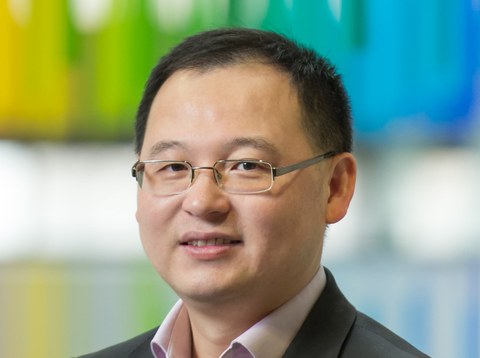Mar 15, 2024
Chemist Prof Xinliang Feng elected member of the Leopoldina
The chemist Xinliang Feng, Professor of Molecular Functional Materials at TUD Dresden University of Technology and Director at the Max Planck Institute of Microstructure Physics in Halle, has been elected a full member of the Chemistry Devision of the German National Academy of Sciences Leopoldina. The Academy and its members provide science-based political and social advice and represent science in international networks.
Prof Xinliang Feng is an internationally renowned expert in the field of 2D materials and functional devices, in particular graphene. His research mainly focuses on precision chemistry and synthesis to discover new materials, including 2D organic crystals, carbon nanostructures and graphene nanoribbons with emergent phenomena and properties to address global challenges.
Since 2014, the Chinese-born chemist has been Professor of Molecular Functional Materials at TUD as part of the Cluster of Excellence Centre for Advancing Electronics Dresden (cfaed). Since 2021 he has been a Scientific Member of the Max Planck Society and Director of the Department of Synthetic Materials and Functional Devices (SMFD) at the Max Planck Institute of Microstructure Physics in Halle. He is one of the world's most cited researchers in the fields of chemistry and materials science according to Clarivate Analytics. Feng has received numerous awards and published more than 700 research articles with more than 109,000 citations and an H-index of 164 (Google Scholar).
The exceptional scientist has now received a further honour: in a multi-stage process, he has been elected a full member of the Chemistry Devision of the German National Academy of Sciences Leopoldina. Feng is extremely honoured by the election: “It is an immense honor to have been elected as a member of a distinguished academy such as Leopoldina. I am humbled to be included among the ranks of so many esteemed figures from scientific history. This membership opens up wonderful opportunities for collaboration with my esteemed colleagues in the academy, and I am eager to contribute to the advancement of science alongside them in the future.“
About the German National Academy of Sciences Leopoldina
As the National Academy of Sciences, the Leopoldina provides independent science-based policy advice on socially relevant issues. To this end, the Academy prepares interdisciplinary statements based on scientific findings. These publications present options for action; it is the task of democratically legitimised politics to decide. The experts who write the statements work on an honorary basis and with an open mind. The Leopoldina represents German science in international bodies, including in the science-based consultation of the annual G7 and G20 summits. It has around 1,700 members from more than 30 countries and brings together expertise from almost all areas of research. It was founded in 1652 and was named Germany's National Academy of Sciences in 2008. As an independent science academy, the Leopoldina is committed to the common good.
Contact:
Prof. Xinliang Feng
TUD Dresden University of Technology
Tel. +49 351 463-43251
Email:

